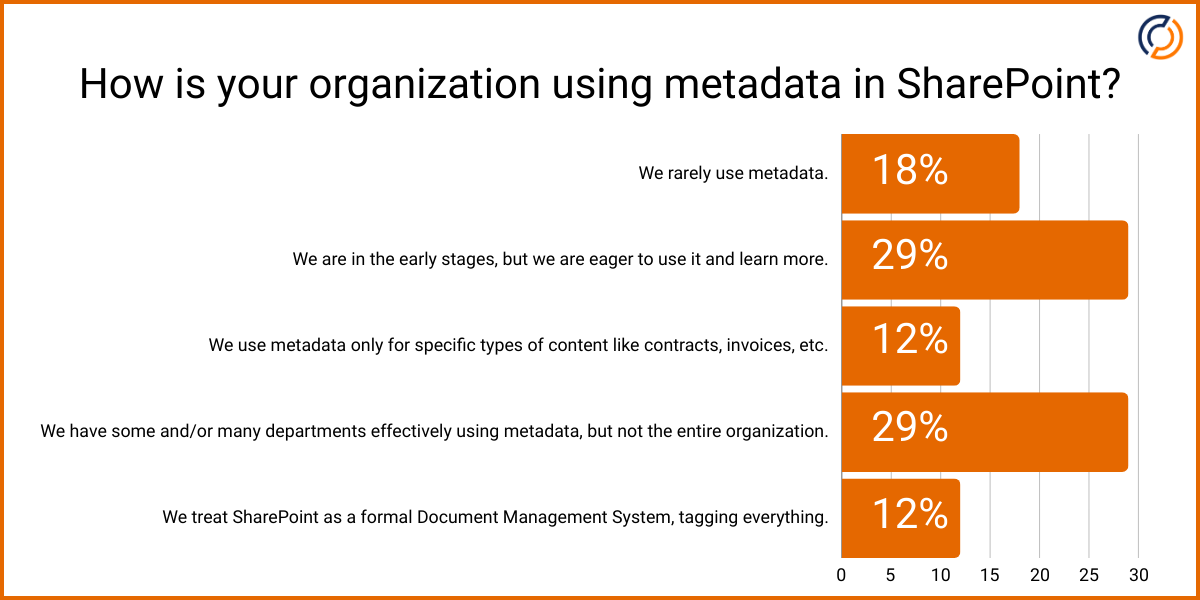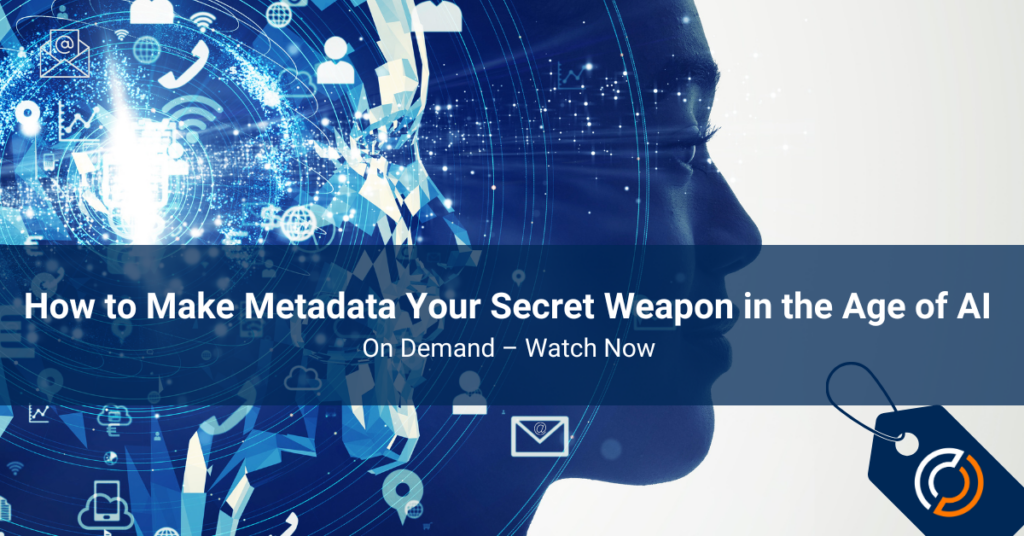Last Updated on March 5, 2025 Jenn Smith
Metadata is crucial for preparing your enterprise content for AI. However, businesses are at various stages in utilizing metadata for content storage.
In today’s digital landscape and the age of AI, data reigns supreme. And an often-underestimated asset holds the key to unlocking the true potential of information management: metadata.
We recently delved into this topic in a webinar How to Make Metadata Your Secret Weapon in the Age of AI. Interestingly, most organizations are just starting to use metadata for their important content and records, according to audience feedback.
As a result, we wanted to delve more deeply into the topic of metadata. In this blog, we’ll explore what metadata is, the importance of metadata to your business and how it can help with AI. Additionally, we’ll provide guidance on how you can start or improve the use of metadata in your organization.
What is metatdata?
In simple terms, metadata is data about data. It includes the details and characteristics of a piece of content. Think of it as a descriptive framework that provides context, structure, and meaning to otherwise raw or unorganized data.
Take the example of a library. Books contain important information. The library’s catalog displays the book’s title, author, genre, publication date, and a brief summary. Similarly, metadata helps organize and navigate the sea of digital content in a structured and efficient manner.
Types of metadata will vary depending on the content. For example, metadata fields for an email may include sender, receiver, date sent and subject. Document metadata may include create date, author, title and last modified date.
Why is metadata important for enterprise content?
There are five main benefits of metadata when it comes to your enterprise content:
1. Enhanced discoverability and searchability
Metadata acts as a powerful tool to help you navigate your enterprise content. Attaching relevant metadata to each piece of information you file means your team can swiftly locate what they need.
2. Improved collaboration and knowledge sharing
Metadata makes sharing content across teams easier. Your team members can quickly identify the content they’re looking for, enabling smoother collaboration.
3. Regulatory compliance and risk mitigation
Metadata helps in tracking data history, aiding audit trails and reducing the risk of non-compliance andlegal issues.
4. Efficient content lifecycle management
Metadata provides insights into content from creation to archiving or deletion. This guides your decision-making regarding content retention and disposition.
5. Improved data analytics and decision-making
By enriching content with metadata, your enterprise can derive valuable insights, patterns, and trends. This allows you to make better decisions and extract maximum value from your data.
Why is metadata important for enterprise content in the age of AI?
Metadata and AI have a close connection. In fact, AI needs content – ideally tagged with metadata – to exist at all. Let’s look at five key reasons metadata is critical for AI to function properly:
1. Metadata fuels AI Algorithms
Metadata acts as a catalyst for machine learning algorithms. By enriching data with descriptive metadata, youempower AI systems to swiftly and accurately process, categorize, and analyze information. This, in turn, enhances the capabilities of AI-driven applications.
2. Metadata enhances data quality and accuracy
Metadata plays a pivotal role in ensuring data quality and accuracy, crucial for training AI models. Well-curated metadata, including information about data sources, formats, and timestamps, aids in validating and verifying data integrity. This minimizes errors and bias that could adversely affect AI-driven insights.
3. Metadata facilitates AI model interpretability
Comprehensive metadata supports the interpretability of AI models. In other words, metadata helps explain how an AI model arrived at its decisions or predictions, fostering trust.
4. Metadata enables adaptive and personalized experiences
With rich metadata, AI systems can personalize user experiences effectively. By analyzing metadata-associated patterns and preferences, AI-powered systems can offer tailored recommendations, content suggestions, or personalized services.
5. Metadata enables continual learning and evolution
Metadata empowers AI systems with the ability to learn and evolve over time. Detailed metadata facilitates tracking changes in content. This enables AI algorithms to adapt and improve over time.
How does your organization stack up in its use of metadata?
Given the importance of metadata to enterprises, you might be wondering how your business stacks up against others.
We put the question to attendees of our recent webinar, and here’s what we found:

As you can see, businesses are at various stages in using metadata in Microsoft SharePoint.
About 60% of businesses either don’t use metadata at all or use it on only some types of content. Additionally, just 12% of companies label all their content in SharePoint. This means businesses need to do more work to ensure complete compliance.
Furthermore, Microsoft’s recently announced SharePoint Premium and Copilot for Microsoft 365. Forward-thinking organizations will want to take advantage of these AI-focused platforms and tools in the future.
However, you must first ‘get your metadata house in order’ to fully take advantage of AI-related technology.
How can I start or improve my use of metadata?
We highly recommend using Colligo. We help you turn metadata into your secret weapon for success.
Colligo auto-applies metadata to emails, attachments and documents upon ingestion into SharePoint seamlessly from within your Office apps. This saves you time, reduces errors and increases your organization’s compliance. Read more about Colligo, AI & Copilot Synergy.
Get in touch with us to arrange a demo or free trial. Or take a look at our recorded webinar now.

Metadata is your essential tool
In summary, metadata stands as an essential asset in enterprise content management, especially in the AI era. By using metadata strategically, you organize and make data more accessible and improve your data governance. Moreover, you unleash the full potential of AI technologies, fostering innovation and efficiency in your business.


